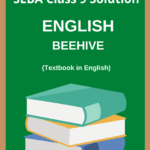Class 9 English Grammar Conjunction, NCERT/SCERT Class 9 English Grammar Notes to each Syllabus wise provided in the list of SEBA Class 9 English Grammar Conjunction can be of great value to excel in the examination.
Class 9 English Grammar Conjunction
Class 9 English Grammar Conjunction Notes cover all the exercise questions in Assam Board SEBA Textbooks. The SEBA Class 9 English Grammar provided here ensures a smooth and easy understanding of all the concepts. Understand the concepts behind every chapter and score well in the board exams.
CONJUNCTION
GRAMMAR
Observe the following sentences:
(i) Ram and Hari are best friends.
(ii) Ram is absent today because he is ill.
In these sentences, the words and, because join words, clause and sentences respectively. Such words which join or connect type words, phrases, clauses or sentences together are calling Conjunctions.
TYPES OF CONJUNCTIONS
Conjunctions are mainly of two kinds:
1. Coordinate Conjunctions
2. Subordinate Conjunctions
1. Coordinate Conjunctions: Coordinate Conjunctions are those conjunctions that join together two words, phrases, clauses or sentences of equal rank or importance. By the term equal rank, we mean two words, phrases or sentences which are not depend on each other or can be expressed independently.
Examples:
(i) Reema and Seema are playing.
(ii) Tell the answer or sit down.
Coordinate conjunctions are of following four kinds :
(i) Cumulative Conjunctions: Those conjunctions which are used for the purpose of addition are called cumulation conjunctions.
Example: (i) Sameer, Rajeev Aakash will perform the one a play together.
(ii) Adversative Conjunctions: Those conjunctions which are used to join contrasting words, statements or sentences are called adversative conjunctions.
Example: (i) He is mischievous yet everyone loves him.
(iii) Alternative Conjunctions: Those conjunctions that join words, or sentences having choices or alternatives are called alternative conjunctions.
Example: (i) Do the homework or you will be punished.
(ii) Study hard otherwise you will fail.
(iv) Illative Conjunctions: Those conjunctions which are used for the purpose of inference are called illative conjunctions.
Examples: (i) We are getting late, so we must hurry.
(ii) He worked hard, therefore he succeeded.
2. Subordinate Conjunctions: Subordinate conjunctions are those conjunctions which join two clauses of unequal rank or importance. In other words, they join an independent and a dependent clause. Some common subordinate conjunctions are if, that, though, till, before, as when, while, etc.
Subordinate conjunctions commonly join words or sentences concerned with time, place, cause, result, condition, comparison, manner, etc. Hence on the basis of their use they may be classified as follows:
1. TIME :
(i) Make hay while the sun shines.
(ii) He arrived home after father had left.
2. PLACE
(i) Let me remember where I kept the wallet.
(ii) You will find me wherever you go.
3. CAUSE
(i) He missed the class yesterday since he was unwell.
(ii) He was suspended because of his misbehaviour.
4. RESULT
(i) This box is so heavy that I cannot lift it.
(ii) This is such a tough problem that nobody can solve it.
5. CONDITION
(i) You won’t reach there in time unless you hasten your speed.
(ii) He became more and more responsible as he grew.
6. MANNER
(i) He did the work as I had asked him to do.
(ii) She didn’t know how to approach me.
7. CONTRAST
(i) Though he had an umbrella with him, he was completely drenched.
Exercise
Pick out the conjunction from each of the following sentences;
(i) The sun rose, the flower bloomed and the birds began to sing.
(ii) We shall certainly come if time permits.
(iii) I waited for him but he didn’t come.
(iv) Hurry up otherwise you will be late for school.
(v) We deal in books as well as magazines.
(vi) Sita is sharp but Geeta is dull.
(vii) He is a well mannered boy therefore he is liked by all.
(viii) Work hard lest you should fail.
(ix) Make hay while the sun shines.
(x) I shall call you whenever you are free.
Ans:
(i) and
(ii) if
(iii) but
(iv) otherwise
(v) as well as
(vi) but
(vii) therefore
(viii) lest
(ix) while
(x) whenever
Fill in the blanks with appropriate conjunctions:
(i) I shall only come ____ the matter is very urgent.
(ii) I read this magazine ____ it carries many interesting facts an information.
(iii) Read these precautions ____ you proceed.
(iv) I took the umbrella ____ the sky was getting dark
with cloud
(v) ____ he studied hard, he failed.
(vi) Rajeev is slow ____ efficient.
(vii) Meena is more beautiful ____ Reema.
(viii) He ran away ____ he should be arrested.
(ix) Hold this book ____ I tie my shoe laces.
(x) We eat _____ we may live.
Ans:
(i) if
(ii) because
(iii) before
(iv) since
(v) Though
(vi) but
(vii) than
(viii) lest
(ix) till
(x) that

Hi, I’m Dev Kirtonia, Founder & CEO of Dev Library. A website that provides all SCERT, NCERT 3 to 12, and BA, B.com, B.Sc, and Computer Science with Post Graduate Notes & Suggestions, Novel, eBooks, Biography, Quotes, Study Materials, and more.






